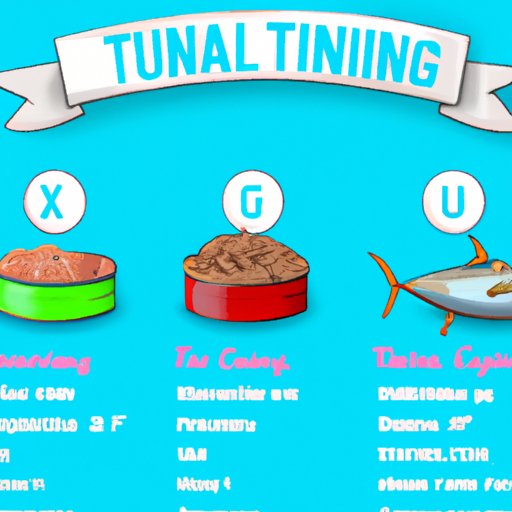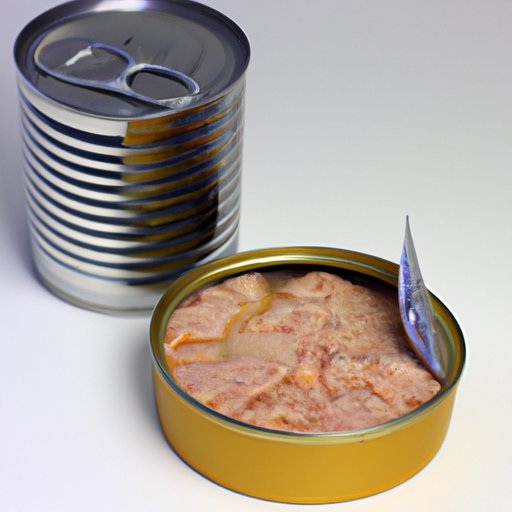Introduction
Canned tuna is a popular and affordable source of protein that can be enjoyed on its own or as part of a meal. It’s also a good source of essential vitamins and minerals, making it a nutritious food choice. In this article, we explore the nutritional benefits of canned tuna, including its macronutrient content and potential health benefits.
Exploring the Nutritional Benefits of Canned Tuna
Canned tuna is a type of seafood that is high in protein and other essential nutrients. It is usually sold in cans that contain either chunked or flaked tuna. The most common type of tuna used for canned tuna is skipjack tuna, but other varieties such as albacore, yellowfin, and bluefin are also available.
Canned tuna is a great source of protein, which is essential for building and maintaining muscle mass. It is also low in calories and fat, making it a good choice for those looking to lose weight. Additionally, canned tuna is packed with essential vitamins and minerals, including omega-3 fatty acids, vitamin B12, selenium, and phosphorus.

A Comprehensive Guide to the Nutrients in Canned Tuna
Canned tuna contains a variety of essential nutrients, including both macronutrients and micronutrients. Here’s a breakdown of the key nutrients found in canned tuna:
Macronutrients in Canned Tuna
Canned tuna is a great source of lean protein. A 3-ounce (85-gram) serving contains about 20–25 grams of protein, depending on the type of tuna used. It is also low in fat and contains no carbohydrates.
Micronutrients in Canned Tuna
In addition to being a good source of protein, canned tuna is also rich in micronutrients. It is an excellent source of omega-3 fatty acids, which are linked to various health benefits, such as improved heart health and reduced inflammation. It is also a good source of vitamin B12, selenium, and phosphorus.

How Eating Canned Tuna Can Help Improve Your Health
Canned tuna is an excellent source of lean protein, which can help support healthy weight management. It is also low in calories and fat, making it a great choice for those looking to cut back on calories. Additionally, canned tuna is an excellent source of omega-3 fatty acids, which have been linked to various health benefits.
Heart Health Benefits
Omega-3 fatty acids, which are found in abundance in canned tuna, may help reduce the risk of heart disease. According to a 2018 study, consuming omega-3 fatty acids can help lower triglyceride levels, improve blood pressure, and reduce inflammation in the body. These effects can reduce the risk of heart attack and stroke.
Weight Management Benefits
Canned tuna is an excellent source of lean protein, which can help support healthy weight management. Protein has been shown to increase feelings of fullness, which can help reduce calorie intake and promote weight loss. Additionally, protein helps build and maintain muscle mass, which can help boost metabolism and burn more calories.
A Dietitian’s Take on the Nutrition of Canned Tuna
Registered dietitian Mary Jane Detroyer says canned tuna is an excellent way to get more protein into your diet. “It’s a great source of lean protein, plus it’s low in calories and fat,” she says. “Plus, it’s an excellent source of omega-3 fatty acids, which have been linked to various health benefits.”
Tips for Including Canned Tuna in Your Diet
Detroyer suggests incorporating canned tuna into your diet by adding it to salads, sandwiches, and casseroles. She also recommends using it as a topping for pizza or in tacos. “Canned tuna is a versatile food that can be used in a variety of dishes,” she says. “It’s also a great option for those who don’t eat fish on a regular basis.”
Alternatives to Canned Tuna
If you don’t like canned tuna, there are plenty of other options for getting more lean protein into your diet. Detroyer suggests trying grilled chicken, lean beef, or tofu. She also recommends eating fish such as salmon, cod, and halibut. “These are all great sources of lean protein that can help support healthy weight management,” she says.

What You Need to Know About the Macronutrients in Canned Tuna
Canned tuna is a great source of lean protein and contains no carbohydrates. Here’s what you need to know about the macronutrients in canned tuna:
Protein Content
Canned tuna is an excellent source of lean protein. A 3-ounce (85-gram) serving contains about 20–25 grams of protein, depending on the type of tuna used.
Fat Content
Canned tuna is low in fat. A 3-ounce (85-gram) serving contains about 1–2 grams of fat, depending on the type of tuna used.
Carbohydrate Content
Canned tuna contains no carbohydrates. This makes it a good choice for those following a low-carb diet.
Conclusion
Canned tuna is an affordable and convenient way to increase your intake of important nutrients. It’s a great source of lean protein, low in calories and fat, and packed with essential vitamins and minerals. Additionally, canned tuna is an excellent source of omega-3 fatty acids, which have been linked to various health benefits, such as improved heart health and reduced inflammation.
If you’re looking for a way to get more protein into your diet, consider adding canned tuna to your meals. It’s a versatile food that can be used in a variety of dishes, from salads and sandwiches to tacos and casseroles. Just remember to watch your portion sizes and choose low-sodium varieties when possible.
Summary of the Nutritional Benefits of Canned Tuna
Canned tuna is an affordable and convenient way to increase your intake of important nutrients. It’s a great source of lean protein, low in calories and fat, and packed with essential vitamins and minerals. Additionally, it is an excellent source of omega-3 fatty acids, which have been linked to various health benefits.
Final Thoughts
Canned tuna is an excellent food choice for those looking to get more protein into their diets. It’s low in calories, fat, and carbohydrates, and it’s packed with essential vitamins and minerals. Additionally, it is an excellent source of omega-3 fatty acids, which have been linked to various health benefits. So if you’re looking for a convenient and affordable way to increase your nutrient intake, consider adding canned tuna to your diet.
(Note: Is this article not meeting your expectations? Do you have knowledge or insights to share? Unlock new opportunities and expand your reach by joining our authors team. Click Registration to join us and share your expertise with our readers.)
